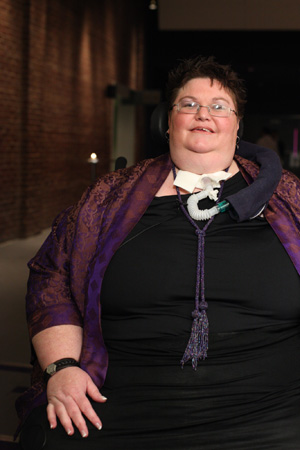Carrie Ann Lucas
From a busy law office in central Denver, Carrie Ann Lucas fights for clients like the deaf woman whose toddlers were put up for adoption because social workers feared that she could not hear their cries; a family whose homeowners association raised aesthetic objections to a fence to protect their 8-year-old son with autism; and a developmentally disabled woman who was permanently sterilized by her doctor without her informed consent.
Census data indicate that at least 15% of American parents with children at home have some disability. These families have long been targets of ill-informed skepticism about their abilities to parent as well as discriminatory and illegal intrusions into their private lives.
Lucas, a successful lawyer and nationally recognized advocate for people with disabilities, defies all the myths by personal example. At 39, deaf and legally blind, breathing through a ventilator and getting around in a wheelchair, Lucas proudly parents four thriving adopted daughters with developmental and physical disabilities, ranging in age from 11 to 20, all of whom experienced abuse and neglect in their birth families and in the foster care system.
Lucas was an athlete whose study of sports medicine was derailed after college when she was diagnosed with a rare degenerative neuromuscular disease. While she was enrolled in law school at the University of Denver, her symptoms worsened. Lucas took a semester off to master Braille and sign language as well as the intricacies of adaptive technologies and went on to graduate 15th in her class.
Her internship at the Colorado Cross-Disability Coalition, a statewide advocacy group run by and for people with disabilities, soon turned into a fulltime job. At CCDC, Lucas was lead plaintiff in an epic 7-and-a-half-year suit against Kmart that resulted in the largest and most far-reaching accessibility class action settlement in history. As an article in New Mobility magazine put it, “If you’ve seen some changes at your local Target or Sears outlet, just remember one person, Carrie Ann Lucas, got the ball rolling.”
In 2004, Lucas launched the Center for the Rights of Parents with Disabilities (CRPD), to address the full range of needs of parents and children with disabilities through legal help, access to the services essential to successful parenting and advocacy for legislative changes to remove statutory bias.
Working for two dozen clients at a time, a fraction of those who seek representation, Lucas and the attorneys and social workers, guardians ad litem and court-appointed advocates she trains are waging a daily battle to enforce the Americans with Disabilities Act. Two decades after its passage, adoption and foster care agencies resist placing children in the homes of disabled parents; jails summarily isolate detainees solely on the basis of their disabilities; mandated accommodations like sign-language interpretation are seldom available in police stations, courthouses and healthcare facilities; regional transportation systems and civic and performing arts centers remain inaccessible.
Lucas’ daughters participate in high school sports and band and choir concerts while absorbing their mother’s model of activism. Lucas readily acknowledges that some people should not be parents and admits that she herself is not perfect. “I’m sure there are people who could do a better job,” she says. “A wealthier mother could afford to stay home with her children, but that wouldn’t be a legitimate reason to take my children away. We should not be social-engineering families on the basis of things like poverty or disabilities.”
 Photo by Joshua Cogan
Photo by Joshua Cogan